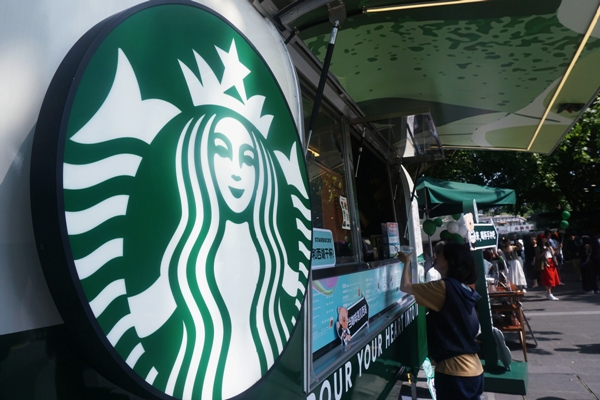
A Starbucks store in Hangzhou, Zhejiang province. [Photo by LONG WEI/FOR CHINA DAILY]
Starbucks plans to increase its store numbers by 50 percent to 9,000 stores by 2025 in China-its second-largest market-as well as double its sales and quadruple its operating income through efforts including store expansion, growth in omnichannel engagement and at-home and on-the-go coffee services.
This is part of the world's leading coffee house chain's Reinvention Plan which was unveiled during the company's biennial Investor Day conference on Tuesday.
The coffee chain operator, which has been outnumbered by homegrown brand Luckin Coffee this year, has grown nearly tenfold in the past decade on the Chinese mainland, on track to reach its goal of 6,000 stores by the end of this year.
Starbucks expects to continue robust store development in China, with net unit growth of about 13 percent annually.
By 2025, the company is expected to open a new store every nine hours to add 3,000 new stores in 300 cities in the country, said Belinda Wong, chairwoman of Starbucks China, during the conference.
In first and second-tier cities, Starbucks China is going to optimize its store portfolio and density in key trade zones. For example, at its reserve stores, Starbucks China is expected to elevate its connections with communities through smarter omnichannel services and operate about 2,500 green stores. The company aims to grow its registered members to 170 million by 2025 from its current 85 million.
Delivering locally tailored coffee innovations is key to the implementation of the plan, according to the company. In the next three years, Starbucks China is investing $220 million in launching its digital technology innovation center in the country to further facilitate its digitalization of store operations and in-house technology and data infrastructure.
Jason Yu, general manager of Kantar Worldpanel China, said Starbucks' investment plan and its commitment to the Chinese market have shown strong confidence in the coffee sector.
"The efforts to further expand their footprint into lower-tier cities as well as to increase density in top-tier cities will continue to popularize coffee culture in the tea-drinking nation," Yu said.
More meaningful are Starbucks' attempts to diversify and optimize its store formats to make them more relevant and convenient for consumers, improving store efficiency.
"Starbucks still has competence in its all-round store portfolios, distribution channels and coffee memberships to help generate more revenue," Yu said.
"Most local brands will find it harder to compete with Starbucks in terms of scale and supply chains, despite their flexibility in innovations," Yu added.
Operating 7,195 stores by the first half year of 2022, Luckin Coffee has exceeded Starbucks in terms of store numbers, driving up two consecutive profitable quarters this year.
Amid fierce competition with local rivals, Starbucks sees the enormous potential in the specialty coffee market in China, as it has a higher demand for premium coffee. Coffee consumption per year has grown from 10 cups per capita in 2019 to 12 cups by the end of this year and is estimated to grow to 14 cups by 2025.
Starbucks has named Laxman Narasimhan as its new CEO, who will officially join Starbucks on Oct 1 this year and will work closely with Howard Schultz before assuming the CEO role and joining the board in April 2023. Schultz will remain a member of the board after the transition.